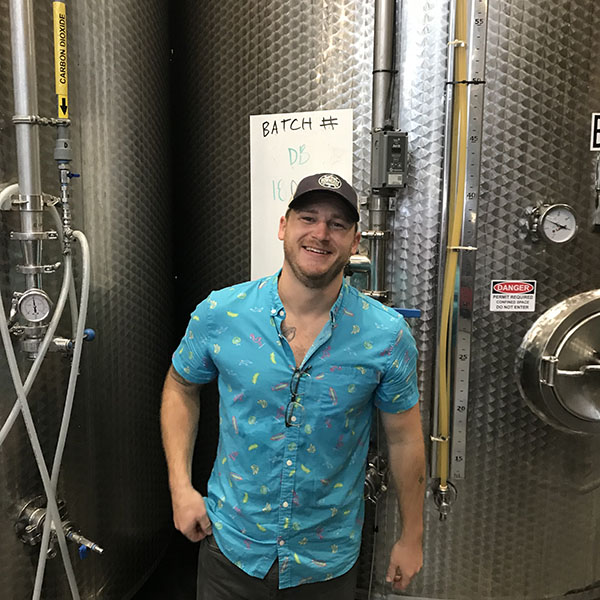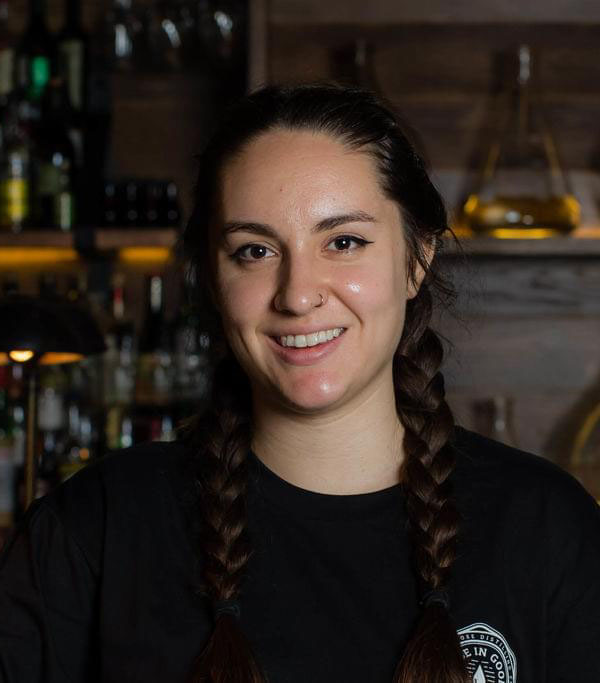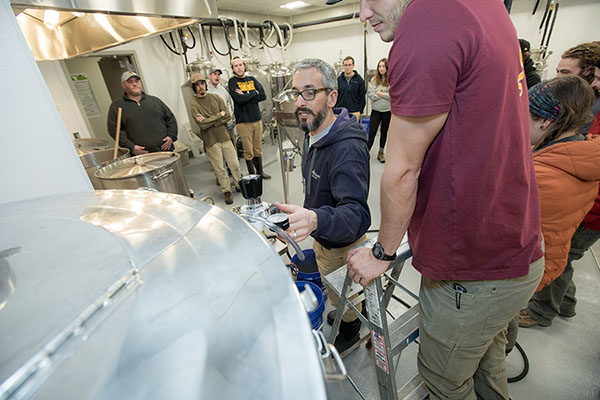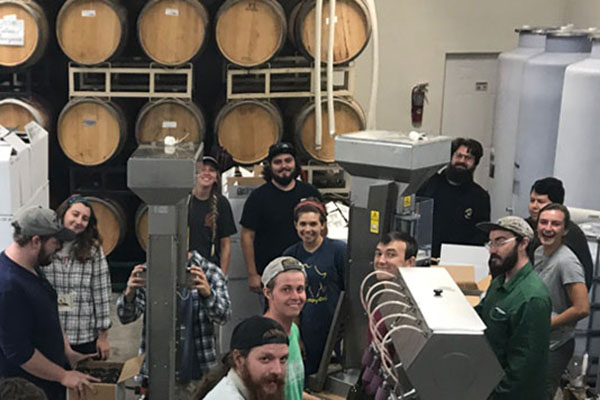Three alumni from the fermentation sciences program at Appalachian State University demonstrate the diversity and versatility of career options open to students in the degree program. From head cider maker and distiller to a manufacturing associate who is cooking up flu vaccines, these graduates also had the opportunity to dabble in different fermentation fields before finding their current positions.
Hopping from grapes to apples
James Haugh ’16 is the head cider maker for Downeast Cider House in East Boston, Massachusetts, a cidery on track to put out more than 45,000 barrels — or almost 1.4 million gallons — of apple cider this year. In this role, Haugh, from nearby Abington, Massachusetts, manages the production team, helps with research and development, sources all raw ingredients and more.
Before coming to Appalachian, he spent six years as a U.S. Naval aircrewman. “I used to brew beer while I was in the service and when the time came to stay in or get out, I decided to get out and pursue a career that didn’t feel like work,” Haugh said.
At Appalachian, he found “many possibilities and opportunities both in and out of the alcohol industry,” he said. Within the fermentation sciences program, he said the faculty were welcoming, helpful and relatable, and they helped Haugh tailor his degree so that he would get the most out of his time at Appalachian. They also opened his eyes to other opportunities outside of brewing beer, he added.
“When I came to Appalachian, opening a brewery was what I wanted (to do),” Haugh said. “After graduating, my love for wine production overtook brewing and eventually led me to converting another fruit’s sugar into alcohol.”
He speaks, of course, about the apples he is now turning into cider. Before working at the cider house, he worked for Grandfather Vineyard and Winery in Banner Elk. It was there Haugh learned about winery operations and got his hands dirty in vineyard management and winemaking.
Whatever path you take, he said, all of the industries that focus on fermentation are growing, and it is important to receive an education that separates you from the competition.
An Appalachian education is paying off for more than just Haugh at Downeast Cider House — the company’s production coordinator, Sarah Marx ’16, is an Appalachian alumna of the program and was one of the founding members of the university’s Fermentation Sciences Club.
Distilling down under
Unsure about a career, Samantha Stefani ’16 moved to Australia with her boyfriend after graduating from Appalachian. The Hanover, Pennsylvania, native is now a distiller at Archie Rose, an award-winning distillery located in Sydney.
At Archie Rose, Stefani is responsible for all day-to-day activities to the production of whisky, gin and vodka. She also assists in product development, product improvement and improving various distillery processes.
“The thing I love most about my job is how creative it allows me to be,” Stefani said. “I get to conduct trial distillations on experimental botanicals and help develop new product recipes and procedures.”
Before she moved to Australia, Stefani had an internship at Warehouse Gourmet in Hanover. Stefani said she chose to come to Appalachian for its location and focus on sustainability. A fermented foods course piqued her interest in the program.
She credits small, hands-on classes and abundant face-to-face time with professors for preparing her for her career. She said that, while tough, the fermentation sciences program is full of incredibly supportive and knowledgeable staff and professors who go above and beyond to help students excel in their degree and succeed in their future careers.
Unlike the many students who go on to work at a brewery, winery or cidery, she found a different passion in the program.
“Although I did enjoy and concentrate my degree on brewing science,” said Stefani, who also minored in chemistry, “I actually felt most passionate about sensory analysis and evaluation of spirits. I found that, for me, distillation and spirits were more interesting and sensory-driven than brewing.”
Stefani said that in the industry, getting a degree in fermentation sciences is not a necessity but is a definite advantage. “The degree (at Appalachian) covers all aspects of fermentation — from the chemistry behind it to the engineering and design of an actual facility,” she said.
“We aren’t just taught how to make beer or wine. We learn how to take care of a vineyard, conduct numerous chemical analyses of beer, wine and spirit samples, make foods ferment safely, conduct sensory panels, run your own business and more. Having a degree in fermentation sciences really opens up a world of opportunities and various types of jobs,” Stefani said. “And,” she added, “there’s also all the whiskey tastings I get to do.”
Brewing beer and … flu vaccines?
When fermentation sciences as a college program was considered something of a novelty, Andrew Gibson ’14 was all in at Appalachian.
He had read an article his senior year of high school about how Dr. Seth Cohen, former director of enology and viticulture at Appalachian, and Dr. Brett Taubman, associate professor, were hoping to have the proposed program passed by the University of North Carolina Board of Governors to become an actual degree.
“I actually chose Appalachian because of the fermentation sciences program,” Gibson said. “I was really interested in it and wanted to attend Appalachian in the hopes that the major was approved. It finally was the summer going into my junior year.”
Gibson, from Kernersville, is now a manufacturing associate at Seqirus, a pharmaceutical company located in Holly Springs. There, he is responsible for maintaining different batches of cell cultures — grown in tanks, like those used in fermenting beer — ranging in size from five to 5,000 liters, and is also responsible for the first step in protein purification.
“Currently, the work I do is to produce flu vaccines,” Gibson said. “It is really great to be part of something that benefits the population as a whole.”
Prior to working for Seqirus, he held brewing positions with Flat Top Mountain Brewing in Banner Elk and Mother Earth Brewing in Kinston, as well as a distilling position at High Wire Distilling in Charleston, South Carolina.
“I can’t think of any other program at Appalachian that is as diverse as the fermentation sciences program,” Gibson said. “Students take classes in chemistry, biology, business, sustainability, soil science and production, and get great hands-on experience in lab, brewery and winery settings. When students start learning fermentation is as vast as it is, they get interested in so many other things than beer.”
That hands-on experience comes in handy in more than just his career; to this day, Gibson still makes kimchi because of the fermented foods class he took.
He said on top of being knowledgeable and driven, the faculty in Appalachian’s fermentation sciences program were supportive in helping students find research and internships. Gibson thinks the best aspect of the program is how interdisciplinary it is, creating well-rounded students who have broad knowledge about their field as well as a thorough understanding of the chemical and biological science of fermented products.
“I think that someone that has a strong knowledge base gained through the program, coupled with years of practical hands-on experience, is a valuable asset to any business,” he said. “That is exactly what the fermentation sciences program can provide.”
About the A.R. Smith Department of Chemistry and Fermentation Sciences
The A.R. Smith Department of Chemistry and Fermentation Sciences offers a Bachelor of Arts in chemistry, a Bachelor of Science in chemistry with eight different concentrations and an interdisciplinary Bachelor of Science degree in fermentation sciences. The department’s programs prepare students to attend graduate and professional schools, as well as for employment in the pharmaceutical and fermentation industries and other business sectors. Learn more at https://dcfs.appstate.edu.
About the College of Arts and Sciences
The College of Arts and Sciences (CAS) at Appalachian State University is home to 17 academic departments, two centers and one residential college. These units span the humanities and the social, mathematical and natural sciences. CAS aims to develop a distinctive identity built upon our university's strengths, traditions and locations. The college’s values lie not only in service to the university and local community, but through inspiring, training, educating and sustaining the development of its students as global citizens. More than 6,800 student majors are enrolled in the college. As the college is also largely responsible for implementing App State’s general education curriculum, it is heavily involved in the education of all students at the university, including those pursuing majors in other colleges. Learn more at https://cas.appstate.edu.
About Appalachian State University
As a premier public institution, Appalachian State University prepares students to lead purposeful lives. App State is one of 17 campuses in the University of North Carolina System, with a national reputation for innovative teaching and opening access to a high-quality, cost-effective education. The university enrolls more than 21,000 students, has a low student-to-faculty ratio and offers more than 150 undergraduate and 80 graduate majors at its Boone and Hickory campuses and through App State Online. Learn more at https://www.appstate.edu.
What do you think?
Share your feedback on this story.









![How NCInnovation Is Rethinking Economic Development in North Carolina [faculty featured]](/_images/_posts/2026/02/rethinking-economic-development-600x400.jpg)







